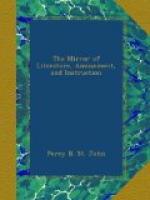The
reeling clouds,
Stagger with dizzy poise, as doubting
yet,
Which master to obey.
Company, in such cases, usually increases the misery. Your wife, with a new dress, soon loses her temper and its beauty; the children splash you and their little frilled continuations; and ill-humour is the order of the day; for on such occasions you cannot slip into a tavern, and follow Dean Swift’s example:
On rainy days alone I dine,
Upon a chick, and pint of wine:
On rainy days I dine alone,
And pick my chicken to the bone.
Go you to the theatre in what is called a wet season, and perhaps after sitting through a dull five-act tragedy and two farces, your first solicitude is about the weather, and as if to increase the vexation, you cannot see the sky for a heavy portico or blind; then the ominous cry of “carriage, your honour”—“what terrible event does this portend”—and you have to pick your way, with your wife like Cinderella after the ball, through an avenue of link-boys and cadmen,[4] and hear your name and address bawled out to all the thieves that happen to be present. Or, perchance, the coachman, whose inside porosity is well indicated by his bundle of coats, as Dr. Kitchiner says, is labouring under “the unwholesome effervescence of the hot and rebellious liquors which have been taken to revive the flagging spirits,” and like a sponge, absorbs liquids, owing to the pressure of the surrounding air.
[3] This expression is not the exclusive property of Oxford, Cambridge, or the Horse Guards. See Shakspeare’s Henry VIII, where the Duke of Buckingham says of Wolsey, “He bores me with some trick;” like another great man, the Cardinal must have been a great bore.
[4] Towards the close of the last opera season we heard a ludicrous mistake. One of these fellows bawled out “the Duke of Grafton’s carriage;” “No,” replied the gentleman, smiling, and correcting the officious cadman, who had caught at the noble euphony, “Mr. Crafter’s.”
That we are attached to wet weather, a single comparison with our neighbours will abundantly prove. A Frenchman seldom stirs abroad without his parapluie; notwithstanding he is, compared with an Englishman, an al fresco animal, eating, drinking, dancing, reading, and seeing plays—all out of doors. A shower is more effectual in clearing the streets of Paris than those of London. People flock into cafes, the arcades of the Palais Royal, and splendid covered passages; and as soon as the rain ceases, scores of planks are thrown across the gutters in the centre of the streets, which species of pontooning is rewarded by the sous and centimes of the passengers. In Switzerland too, where the annual fall of rain is 40 inches, the streets are always washed clean, an effect which is admirably represented in the view of Unterseen, now exhibiting at the Diorama. But in Peru, the Andes intercept the clouds, and the constant heat over sandy deserts prevents clouds from forming, so that there is no rain. Here it never shines but it burns.




